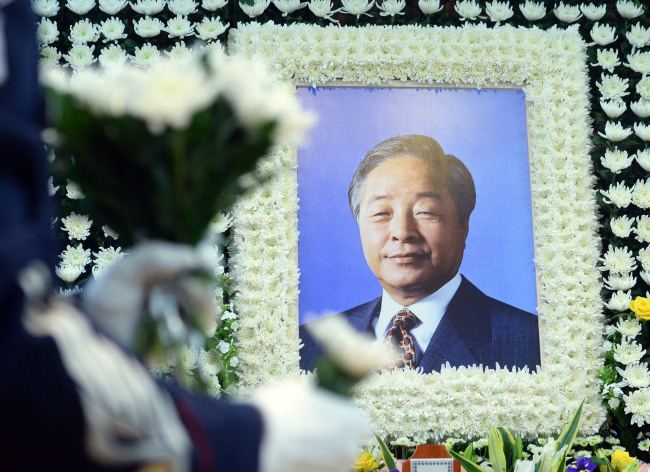Former South Korean President Kim Young-sam, the iconic democratic fighter that ushered in an era of civilian leadership, but whose presidency ended on a sour note due to the country‘s financial crisis, passed away early Sunday. He was 87.
Kim, who led the nation from 1993-1998, died of sepsis and acute renal failure at around 12:22 a.m., according to Oh Byung-hee, the head of Seoul National University Hospital where he was hospitalized last Thursday for high fever and breathing difficulties.
 |
| 빈소에 놓인 YS영정 (서울 사진공동취재단=연합뉴스) 故 김영삼 전 대통령 영정이 22일 서울 종로구 서울대병원 장례식장에 마련된 빈소에 놓여 있다. 2015.11.22 zjin@yna.co.kr/2015-11-22 10:20:20/ The late former President Kim Young-sam’s photo is displayed at his wake at Seoul National University Hospital in Jongno-gu, Seoul, Sunday. Yonhap The late former President Kim Young-sam’s photo is displayed at his wake at Seoul National University Hospital in Jongno-gu, Seoul, Sunday. Yonhap |
Along with former President Kim Dae-jung, who died in 2009, he was a leading pro-democracy campaigner against authoritarian general-turned-leaders such as former presidents Park Chung-hee and Chun Doo-hwan, who together ruled the nation through most of the the 1960s to 1980s.
Toward the end of Kim’s presidency, his political feats including purging politicized generals were eclipsed by his son’s influence-peddling and his poor handling of the economic crisis that forced the nation to seek a bailout from the International Monetary Fund.
“He has already undergone surgery several times before, due to blockages in the cardiovascular system. Adding to that was sepsis and acute distress, which led to a weakening of his heart and then his death,” Oh told a press conference as he confirmed Kim’s death.
“Stroke is caused by a blockage in the blood vessel. We believe Kim died due to the worsening of his chronic illnesses.”
After he was hospitalized for a stroke and pneumonia for 18 months to October 2014, concerns persisted over Kim’s waning health.
His family, including second son Kim Hyun-chul, a professor at Kookmin University, stood by his deathbed. His wife Son Myung-soon was not present in his last moments. She was informed of Kim’s passing several hours later and reportedly broke down in tears.
During a Cabinet meeting, the Seoul government decided to hold a five-day state funeral for the late leader. The funeral committee will be headed by Prime Minister Hwang Kyo-ahn.
The funeral ceremony is to be held Thursday at the National Assembly where an official government altar for Kim is to be set up. Kim is to be laid to rest at Seoul National Cemetery in southern Seoul.
Kim, along with Kim Dae-jung and political heavyweight Kim Jong-pil, led the “Three Kims” politics in the 1980s and ‘90s. The Three Kims era faded officially into the past in 2004 when Kim Jong-pil failed to retain his parliamentary seat for a 10th term and retired from politics.
As a fighter for democracy, Kim’s life was tumultuous. His campaign against military rule put him behind bars and under house arrest. But it contributed to undermining military-backed leaderships, reforming the Constitution to enable a direct presidential election system and facilitating democratization.
Born in December 1927 on the southern island of Geojedo, Kim was elected to the National Assembly at age 26, which still marks the youngest elected as an assemblyman, in 1954. He served as a lawmaker for a total of nine terms.
President Park Geun-hye, who was in Malaysia for summit meetings involving the Association of Southeast Asian Nations and other nations, expressed her condolences.
“After being informed of the death of former President Kim, I expressed my deep condolences and pray for the repose of the deceased,” Park was quoted as saying by Cheong Wae Dae spokesperson Jeong Yeon-guk.
“Our government will prepare, with honor, for his funeral in accordance with the related laws and the wishes of his family.”
The leaders of rival political parties visited a memorial altar to pay respect to the late leader.
Rep. Kim Moo-sung, leader of the ruling Saenuri Party, called the deceased leader his “political father.” He had entered politics in the 1980s with the help of the former president.
“Kim was a political leader who achieved our society’s actual democratization,” said Kim Moo-sung, tears forming in his eyes.
Moon Jae-in, the leader of the main opposition New Politics Alliance for Democracy, said the nation should uphold the former leader’s spirit and philosophy for democracy.
“I feel very regretful that Kim, who enabled democracy to take root in this country and led the pro-democracy movement, passed away when our democracy is now facing a crisis again,” Moon told reporters.
Moon hails from Kim’s hometown of Geojedo Island and graduated from the same middle and high schools Kim attended. In 1990, Moon also joined a pro-democracy campaign then led by the late activist leader.
Kim Jong-pil also appeared at the memorial altar, saying the former president will be remembered forever in the minds of citizens as a “leader of determination.”
By Song Sang-ho (sshluck@heraldcorp.com)

